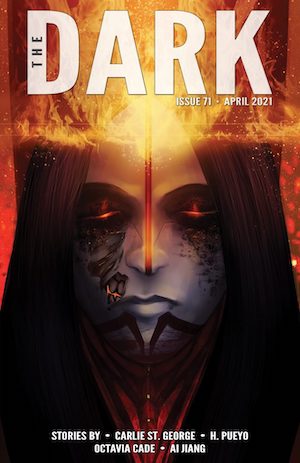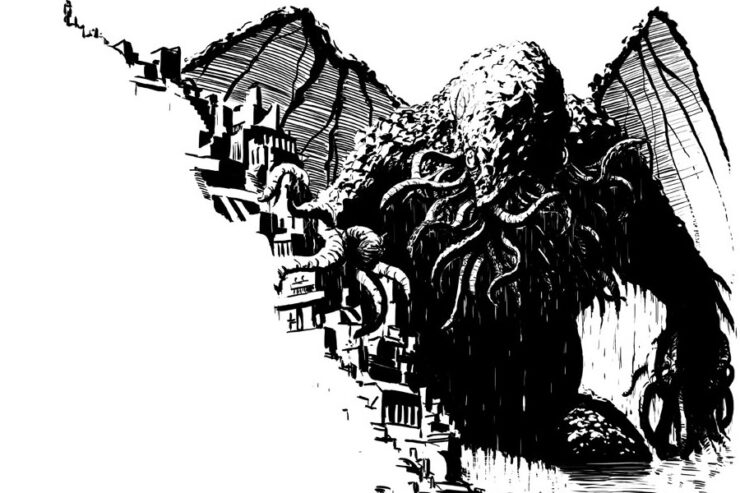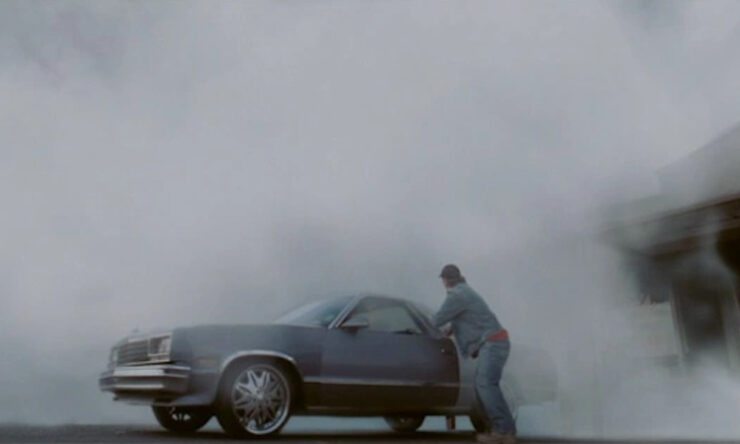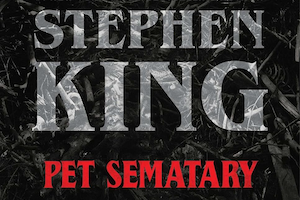Welcome back to Reading the Weird, in which we get girl cooties all over weird fiction, cosmic horror, and Lovecraftiana—from its historical roots through its most recent branches.
This week, we cover Carlie St. George’s “Forward, Victoria,” first published in the April 2021 issue of The Dark. It’s currently up for a Shirley Jackson, and well worth your read. Spoilers ahead!
“It’s strange how many children are unhappy when you murder their parents.”
It wasn’t bad enough that she was a gawky teenager whose one desire was to become invisible—her very name begged for ridicule. “Wait, Victoria Waite!” was the chant Molly Guzman started. Victoria hated Molly’s pretty face and the bruises Molly didn’t bother hiding, her pink-streaked hair and juvenile delinquent coolness. At fourteen, Mollie shoved Victoria against the bathroom wall, and Victoria kissed her, and Mollie kissed her back hard. It couldn’t happen again, Molly said. Victoria agreed. Going forward, they never became friends exactly, but they nodded occasionally when unobserved. It was “a silent confirmation: I see you. You see me. We’re both still here.”
Todd Clarke, baseball star and theater nerd, she met when her guidance counselor forced her to join Drama Club. Strawberry-red hair, goofy smile, the love of her short life. At sixteen, she died for the first time. The community admired her parents, knowing nothing of the filthy burlap “Redemption Gown” they made Victoria wear whenever they hurt her. Trying to save her. One time they tried to save her too hard. Disposal became necessary, and they tossed her into a well.
Todd resurrected her first, tossing a coin into the well and chanting: “Victoria Waite, Victoria Waite. Where did you go? Come back, it’s late.” That first time, she didn’t wear the red prom gown that would become her signature. But “evolution is part of being a monster; the legend shifts, and you shift to fulfill it.” Three rules are changeless. The summoner invokes Victoria’s name. They are at a Significant Place. They wish for a death.
And then she wakes. She’s still skinny, but her arms are now powerful with the “particular type of strength…you only get from climbing out of your grave.”
***
Resurrected Victoria went first for her parents, but they’d moved away. Then she looked for the guidance counselor, but found Todd’s father instead: terrible gym teacher and stereotypical coach. Terrible father, too, who shrugged off Todd’s fears about his girlfriend’s parents. Victoria shoved a golf club down his throat. Molly’s abusive mother she contorted into “flesh origami.” Flesh origami would become another signature, rather than any particular weapon. Weapons become weaker with use. Not so her hands—it only took one to choke the counselor, who had “believed” her panicked denial after confessing to her parents’ abuse.
Todd and Molly were thrown into the sheriff’s station, Todd suspected of killing his father, Molly for public intoxication. They fled the bloodbath Victoria enacted there, killing the sheriff and deputies. They hadn’t understood yet that Victoria wasn’t coming for them, two kids who hadn’t failed anyone yet.
So it was Todd who killed her the second time, stunning her with the old (now magical?) incantation of “Wait, Victoria, wait!” and then shoving her back into her well-grave.
***
“Time means much less when you’re dead,” and Victoria’s been dead a long time, but someone always summons her back. This time it’s two little girls chanting “Victoria Waite,Victoria Waite, kill my parents so I can stay up late!” She doesn’t understand the children who are unhappy when she kills their parents. One little girl screams at the carnage, but the other is wise enough to be grateful.
A bonus. Victoria finds an invitation to a 20-year high school reunion that the dead parents obviously intended to skip…
***
She walks to the high school in her red prom dress. In the parking lot she kills two women from her algebra class. A deputy dies next, then a drunk man making lecherous comments about his daughter. The gym is packed; it’s been a long time since she last returned, and people have gotten too comfortable. Across the gym, a woman in ripped black jeans and an owl mask nods at Victoria. Someone must find a corpse at that point, for screams trigger pandemonium. A man calls Victoria’s name: it’s Todd, but the love-of-her-life is so old now. He asks if Victoria knows he’s become a counselor, to prevent other kids from being failed as she was. He failed her, too. He’s so sorry, but the gasoline can he holds is the only way he can save her, get them both peace.
Victoria never blamed Todd, back when he was a kid. But she doesn’t want anyone to save her.
The owl-masked woman—Molly—cursesTodd: Victoria’s not after him! Don’t do this! Todd ignores her. He triggers a booby-trap that drops a rafter on Victoria, pinning her to the floor. Then he lights the gym on fire and runs, dragging Molly with him, leaving Victoria to burn.
She can’t feel the flames; dying means you can’t feel anything anymore, and not feeling means you can push aside the rafter and walk out of the exploding gym. Molly is there, and Todd, who stumbles away, crying “Wait, Victoria Waite.”
His weapon-spell, grown weak with use, doesn’t work this time. Victoria snaps his neck. Molly doesn’t run. She says that she tried to tell Todd that some people didn’t want peace. Victoria doesn’t want it, does she, or she wouldn’t keep coming back.
Molly hands Victoria a list of names, addresses, occupations, “ages and sins.” “Victoria Waite, Victoria Waite,” she intones. “Send these fuckers to their fucking fates.”
Usually Victoria doesn’t help adults, but Molly has invoked Victoria’s name and is in a Significant Place and has wished for a death. And so Victoria slips on the owl-mask, takes the list, and walks away into the night.
What’s Cyclopean: “Words are just words until they have power; until someone has used them to beat back the night.” For Victoria, the powerful words are deadly rhymes, and the demand to “wait.”
The Degenerate Dutch: Victoria’s parents beat her to death for going to a dance with a boy. She never dared to let them know she was bi.
Weirdbuilding: Victoria draws on urban legends of prom night ghosts, rhymes you shouldn’t say into a mirror, and slasher films.
Madness Takes Its Toll: Molly spends a lot of her teens acting out and drinking, trying to deal with the horror of her own parents. Todd becomes a school counselor, trying to offer the help that Molly and Victoria never got.
Ruthanna’s Commentary
Adults fail kids, and it’s always a horror. We know that, and we tell stories about it, from the subtle to the grotesque. Some of the most grotesque, we don’t like to handle straight on—so they turn sideways into half-jokes and campfire stories, exaggerations to hide the immensity of the original. Campfire stories turn into urban legends, turn into skipping songs and bravery-proving rituals, turn into more stories about what happens when those rituals work.
Kids can be terrifying, in the things they take in and transform.
A few weeks ago, Anne glossed Taaffe’s “As the Tide Came Flowing In” as such a story, pointing up the difference that can be made by the mode of telling. “Forward, Victoria” is closer to its source mode, the other side of the veil from a slasher movie or a Steven King novel. Or a gaggle of kids giggling nervously through a “Bloody Mary” chant at a sleepover. There was this girl who went to the prom, and never came home—but sometimes she’ll hitch a ride, still wearing her dress, from someone who then never comes home. There was this girl who went to the prom, and they dumped blood on her, and then she turned out to be a monster. There was this girl who went to the prom, and came home, and no one saw her alive again—but if you chant her name…
Kids know that adults can be monsters, and sometimes they fantasize about being a bigger monster.
I’m also put in mind of Seanan McGuire’s Sparrow Hill Road and Girl in the Green Silk Gown, another take on the urban legend in the prom dress. Rose Marshall is kinder company than Victoria Waite, but there’s a scarier monster whose reputation stains hers. Victoria’s become a killer shaped by her story and her dying fury, but one who still holds a kernel of the original fantasy. She just can’t see anything in adults now but monstrosity.
Kids tell stories about monsters to try and convince themselves that the world contains something other than monsters.
I’ve also just torn through Tamsyn Muir’s Locked Tomb series (two rereads plus Nona), and so am also thinking about revenants, and the varied terrible options for half-life after death. Part of the horror of Victoria is what she does, but so much of the horror is what she’s become. An abused kid deserves so much better than to be reduced to a story and a murder method. She deserves the life she should have had, the friends and lovers and kisses far away from her parents’ efforts at salvation.
Taaffe’s Ezra McCay retains something of his passions from life. Stoker’s judge is the other end of the spectrum, terrible in death because he wasn’t anything more in life. Victoria has nothing left but the shape given by those who summon her, and the litany of those who failed her, and the masque of that failure over whoever’s unfortunate enough to be in the vicinity.
Kids tell stories to imagine being the ones with control over life and death. And sometimes, those stories fail the kids who become them.
Anne’s Commentary
Speak of the Devil by name, and he will come. So will many other fell deities, demons, fairies, and… ghosts. Vengeful ghosts in particular, like those durable urban legends Bloody Mary and the Candy Man. Often the summoning requires additional ritual action. Bloody Mary must be invoked before a mirror by saying her name three times (or maybe seven, and maybe at some particular time.) Ditto for the Candy Man, though he demands a five-times name repetition. Victoria Waite isn’t fussy about mirrors. In life, she probably avoided them. Ideally, you should be within chanting distance of her well-grave. Critically, you’ll need to have thought up a couplet that rhymes with her last name. She always hated those punny taunts, so hearing yet another will rouse her from her death-sleep, angry enough to claw her way out of the well.
So you better be ready with the names of adults who’ve abused or neglected children, or who’ve failed such children by looking away from their distress. Adults, remember—she won’t touch kids. Whereas she seems to suspect all adults of being abusers to some degree. Given the “love” she received from her own parents, you can’t blame her.
If you’re not a kid yourself, you might better let Victoria sleep. Ditto if you’re a kid who’s not absolutely sure you want your parents turned into flesh-origami.
Arguably the most widely known Tormented-Teen-Strikes-Back (Supernatural Variant) is Stephen King’s Carrie and its film adaptations, notably Brian de Palma’s 1976 version. St. George’s nods to Carrie are numerous. Victoria, like Carrie White, is the socially inept weird girl—and not weird in a cool way, like Molly. How could they be otherwise than weird given their repressively religious parents? Margaret White has Carrie afraid of every sexual inclination. Victoria’s parents are outright malign, their abuses in the name of God brilliantly epitomized in the “Redemption Gown” hair-shirt she’s forced to wear during righteous chastisement. Carrie goes to the Big Dance with nice-guy Tommy, “lent” to her by his girlfriend, who sympathizes with the school pariah. Victoria’s luckier—she has her own boyfriend in nice-guy Todd to accompany her to the Big Dance. Carrie’s mother ends up killing her, as Victoria’s parents do Victoria. Both Carrie and Victoria figure in the immolation of their high school gyms—prom and reunion decorations are too damn flammable, party planners take note!
Critical differences: Chris Hargensen, chief Mean Girl in Carrie, is irredeemably Mean and deserves her death by telekinesis. Molly is a Mean Girl redeemed by an empathetic connection to Victoria that, satisfyingly, never sands away Molly’s defensive spikes. St. George delivers a delicious description of how Molly does Victoria’s makeup for the Big Dance while “completely and aggressively ignoring [her].” Almost complete and aggressive indifference is how Molly’s handled all her attraction to Victoria.
Victoria, in fact, has had two loves-of-her-too-short-life. Most of her story actually takes place after her death. “Forward, Victoria” is a title explained when the reader realizes what Victoria’s up to: Between oblivious death-naps, she’s summoned back to duty and given her marching orders with the classic military exhortation: “FOOOR-ward!”
See, Molly’s right. Not everybody wants peace, even when they’re supposed to be resting in it. I’m seeing this story as an answer to the question: What if Carrie White had come back from the grave to pursue further revenge? In his closing sequence, De Palma hints that she might not sleep easy in her scorched-earth grave: The sympathetic classmate Sue Snell dreams that she visits Carrie’s grave with flowers, but as she lays them down, Carrie’s bloody hand bursts out and seizes her arm. Sue wakes screaming, inconsolable. Carrie doesn’t need to come back. She’s already destroyed much of the town, and as Sue’s trauma shows, she won’t be forgotten soon.
Victoria, on the other hand, had no opportunity in life to vent her bottled-up rage, a rage that if released would “take out everyone in [her] vicinity,” like “a storm of [her] broken, bloody shards.” This fury lies latent in her corpse, at the service of any child in need of an avenger. Call Victoria a ghostly soldier with a just cause. At the same time, probably too often, call her a mercenary unworried about collateral damage, like the little girl who was only kidding about having her parents offed so she could stay up late.
I suppose it could be a good thing if Molly provides Victoria with so many “sinners” that she doesn’t get any down-time in the well. That way she wouldn’t be at home for ambivalent kids.
That’s assuming perpetually angry Molly is never wrong about who deserves a visit from Victoria in her new war-mask. Snowy owls are no-joke predators. Ask any lemming.
Next week, we continue N. K. Jemisin’s The City We Became with Chapter 13: Beaux Arts, Bitches, in which the borough avatars are for some reason not entirely on board with getting eaten.
Ruthanna Emrys’s A Half-Built Garden is now out! She is also the author of the Innsmouth Legacy series, including Winter Tide and Deep Roots. You can find some of her fiction, weird and otherwise, on Tor.com, most recently “The Word of Flesh and Soul.” Ruthanna is online on Twitter and Patreon, and offline in a mysterious manor house with her large, chaotic, multi-species household outside Washington DC.
Anne M. Pillsworth’s short story “The Madonna of the Abattoir” appears on Tor.com. Her young adult Mythos novel, Summoned, is available from Tor Teen along with sequel Fathomless. She lives in Edgewood, a Victorian trolley car suburb of Providence, Rhode Island, uncomfortably near Joseph Curwen’s underground laboratory.














